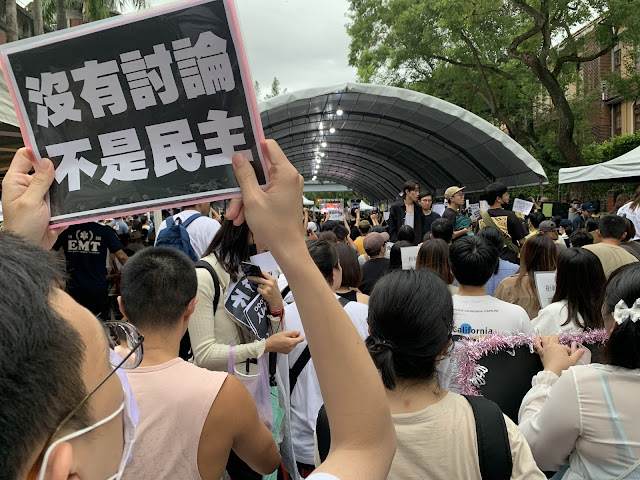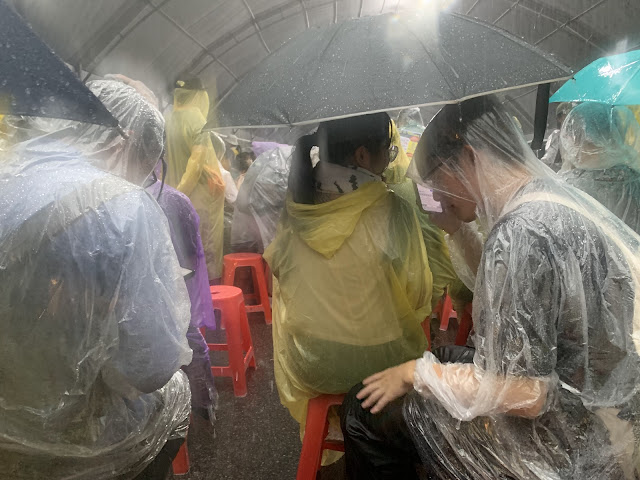I don't have time to make this pretty, so let's talk about what's happening at the Legislative Yuan right now.
After adjourning on Friday, not having passed the most controversial aspect of the legislative reform bill -- the "contempt of the Legslature" clause (clause? I don't have time to check) -- lawmakers were to re-convene today to finish discussing it.
"Contempt of the Legislature", if passed, would allow the legislature to drag just about anyone they want in for question-and-answer sessions, and they could be sent to court if the legislators don't like their answers. This is meant to criminalize lying to the legislature, concealing evidence, procrastinating or refusing to appear -- which seems reasonable, but isn't. More on that below, or just read my last post, or whatever you want in English. I probably won't cover it in full in this post.
Today, thousands gathered at the Legislative Yuan to protest the bill yet again. Miao Poya (I mention her here and here) spoke to a crowd of about 3,000 this afternoon. By the time I arrived in the late afternoon, the crowd was clearly bigger than that, though I can't begin to estimate. It had gone well past the large tent cover set up in front of the main stage and was starting to spill onto Zhongshan Road.
My friend's photo:
When I arrived, police buses ran down what I believe is Jinan Road (I didn't really check), and you could see people streaming toward the venue. I haven't seen a police presence like that in years, nor a protest big enough to warrant one. (Arguably no protest warrants one, but...discussion for another day).
I saw a lot of old-school protest imagery: sunflowers, for the Sunflower Movement, the ubiquitous black t-shirts, teal-colored stickers, headbands that said "if the KMT doesn't fall, Taiwan won't be good" (國民黨不倒,台灣不會好 -- it sounds better in Mandarin) which might be new, or might have been dug out of retirement by former protesters. There were even pro-Hong Kong flags as well as several rainbow flags from the marriage equality rallies.
People were quite literally grabbing whatever they had at home from the past to join this protest. I'm sure once the stickers and t-shirts and bandannas and banners become available, there will be a cohesive design to it all, but remember, all the left-of-center protests of the past -- some labor protests excepted -- seem to follow a similar design language. It all works together. It's cohesive, and gives the element that in Taiwan, all of us with our various causes come out to support each other.
I say "us", but I really mean them. I can go, and chant, and stand in the rain, but I'm not Taiwanese. I'm there to support, I don't know what else I can do. Regardless, I love to see it.
In fact, one of the speakers while I was there directly referenced Hong Kong, likening this bill and the method being used to pass it to the undemocratic processes that are now the norm in Hong Kong ever since the protests were quashed and pro-Beijing elements (I'd call them fascists but hey) took over.
Of course, being a Taiwanese protest, there were chants calling to send back the bill, "Go Taiwan!" and "Go democracy!" (台灣加油,民主加油), "oppose the black box" (the tactics being used to pass the bill without anyone knowing what's in it is locally referred to as "black box" politics), "No discussion, no democracy" and at least one call for Huang Kuo-chang (黃國昌), the former Sunflower leader who is now colluding with pro-China elements and their assorted simps, to step down. I can't think of anyone whom the activist community reviles more today than that man.
Funeral-like flowers for the KMT:
While there, a speaker rallied the crowd by saying they'd grown to 12,000. I don't know if that's true -- upper estimates put it at 8,000 -- but it was quite a sight regardless, not something we've seen much of during Tsai's tenure and the DPP's legislative majority. Tsai also left office with a surprisingly high favorability rating, for Taiwan.
That could be because the DPP's general platforms -- with some imperfections -- are closer to the general consensus in Taiwan. It could be because the DPP legislature more or less did a competent job. It could be because KMT supporters simply lack the vim and vigor of sustained activism and protest. Most KMT protests seem to be oldsters bussed in and given a free lunchbox.
These protesters were...not that. They are young, mostly, and they are angry. They remind me of the Sunflowers. If this is Taiwan's Gen Z, then the kids are going to be alright.
Back to the protest: partway through my time in the crowd, it started pouring. People handed out free ponchos. I was given one, but got soaked anyway. Speakers asked the crowd to move forward as much as possible to get more people under the cover, and to use ponchos rather than umbrellas, which is smart in a crowd. People came through not long after to distribute drinking water.
I love to see that sort of cooperative action in protests and movements.
The rain only got worse, but here's the thing: not many people left. Of course, in any protest, especially one that spans hours, people will come and go over time. But I didn't see any substantial number of empty seats even when it really started to drench the crowd. Thunder boomed, but people stayed. Someone handed out a bunch of signs run on a printer and slipped into plastic covers.
On the way to the protest I talked to an older man trying to park his bike. He said he was outside to support the Sunflowers a decade ago, and he's back again to stand up for democracy now. His daughter, he said, was already in the crowd.
While we were getting utterly rain-blasted, I traded sorrowful looks with the woman next to me. Without prompting, she said, "this is democracy". She did not leave. Neither did I.
I'm telling you, the kids are gonna be alright.
My phone got soaked -- it currently won't charge with a cable -- my leather bag got soaked, my pants got soaked, my shoes got soaked. The ground beneath our feet turned into one massive puddle. Still, people stayed, I went to put my phone back in my bag, wet despite being under my ill-fitting poncho. A young man (early 20s?) used his plastic-covered sign to keep the rain off.
At about 7pm, the session seemed to be still ongoing, with the DPP playing the old Sunflower anthem Island Sunrise. The KMT started raising patches of the ROC flag (which has the KMT emblem on it).
I left when I started to genuinely worry about my phone, and was shivering from being soaked. I also happen to be sunburned from yesterday's inauguration, which is not a great combination. The woman who'd said "this is democracy" urged me to go, saying "health comes first" and there will be other chances to protest.
At about 8pm, a friend of mine messaged me a bunch of photos -- one his, one from the protest's Line group -- showing the protest had spilled out into Zhongshan Road. A verbal estimate put the crowd at over 15,000.
Here's the Line group photo:
So what's wrong with the bill?
First, there's what it could mean. From Michelle Kuo on Twitter:
China publishes a list of Taiwan independence activists, those legislators can summon them to be questioned. The [activists] can be fined from 20,000 NTD to NTD 200,000. This is written in article 25, the amendment they just passed. And that completely bypassed committee review.
From Chen Yen-han:
The bill would give the LY power to summon essentially anyone and make them answer questions.
This is not necessarily bad. What is bad are the proposed criminal penalties when the LY deems someone’s answer a refusal or falsehood.
This would give a partisan coalition a monopoly on truth, which is very bad.
A minister who refuses to divulge classified information could, under the provisions of this bill, be punished.
There is at least one current MLY who leaked sensitive info on Taiwan’s defense programs.
You should also read this entire thread from Michael Turton. Here's a snippet:
We know what tactics they will follow because they've done that before. One way they will use this power is to subpoena local DPP politicians to again smear them and even better, toss a few in the clink...
The KMT can simply refuse to act on taiwan's defense by claiming their too busy with internal investigations. This will tie up the legislature for years. Further...they will investigate government ministers and bureaucrats hoping not only to interfere with the functions of government, but to bring to light information on government connections with other government and on defense and weapons programs....The subpoena powers can be used against Ordinary People. Members of the Foreign Press should recall the era of Visa denials of journalists. Under this law there's nothing to stop the legislature from subpeona-ing a foreign journalist whose coverage they do not like.
There's also a great Youtube video with English subtitles from Puma Shen, the activist and legislator who was pushed off a table and fell on his head on Friday.
One of the biggest problems is that nobody really knows what's in the bill, as a last-minute version cobbled together from all proposed versions was not read out in full and not made available to legislators in time for the vote. This was apparently done by KMT caucus whip (and criminal, and sex pest) Fu Kun-chi, speaker Han Kuo-yu, and former Sunflower and New Power Party founder-turned-TPP supporter Huang Kuo-chang, who right now might be the most reviled of the three. Remember, he was once on the same side as the people out there protesting tonight, and now he's working with his former enemies and enemy-adjacent randos. (No, I will not attempt to phrase that more elegantly).
Secondly, the KMT and TPP keep insisting that "substantive discussion" of the bill has taken place, and thus have ushered it to a vote. (There are also a bunch of infrastructure bills to be discussed, and nobody's talking about what might or might not be in those, so that's not good either).
This is absolutely a lie, spearheaded by Huang Kuo-chang. The DPP was intentionally kept from participating in said 'substantive discussion', their own proposals dismissed before they could even be considered. Essentially, the KMT and TPP are railroading everything and calling it "democracy" because they have a thin majority coalition.
The votes themselves are being done by a 'show of hands' rather than individual votes with names recorded. While this is technically a legal mechanism for voting, as far as I know, it's not typical and hasn't been used in Taiwan in decades. The KMT/TPP would insist that it's necessary as the DPP keeps blocking a more traditional vote. Apparently, the "show of hands" vote tallies keep getting messed up, which is extremely suspicious and unnerving.
I'm not the only one who is likening this to Sunflowers 2.0 -- they protested black box politics too -- and the White Terror. And if something in Taiwan reminds you of the White Terror, well, that should be terrifying.

























